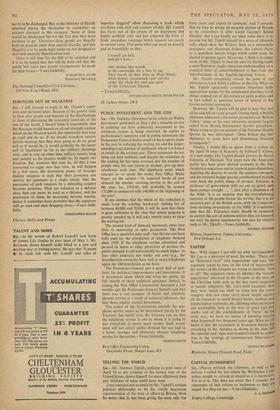TELLING THE WORLD SIR,—Mr. Norman Tiptaft, replying in your issue
of April 24 to my criticism of his lecture tour of the United States, damns himself far more effectively than any strictures of mine could have done.
I was annoyed not so much by Mr. Tiptaft's antique political philosophy as by his totally inaccurate representation of the state of affairs in Britain. Now he writes that he has been giving the same talk 'for
forty years and expect to continue,' and I concede that he may be giving an accurate picture of Britain as he remembers it after Lloyd George's Khaki Election. But I can hardly see what value there is to anyone but Mr. Tiptaft himself in a series of blimpish talks which show the Welfare State as a universally unpopular and disastrous failure, the Labour Party as a scurrilous lunatic fringe which could never be elected to govern again. Moreover, I think it is rather naive of Mr. Tiptaft to base his case for having made a contribution to Anglo-American understanding on a standard letter of acknowledgment to him from the Vice-President of the English-Speaking Union.
Mr. Tiptaft completely missed the point of my reference to Lord Attlee's address in this city. Whereas Mr. Tiptaft apparently considers American halls appropriate arenas for his unbalanced diatribes, Lord Attlee stepped out of the context of party politics and in fact talked in generous terms of several of his former political opponents.
However, Mr. Tiptaft will be glad to hear that not all be said fell on stony ground. During April, a British diplomat addressed a discussion group here on 'Britain Today,' using on his own admission material largely culled from British Information Service pamphlets. While trying to give an account of the National Health Service he was interrupted : 'Does Britain pay her diplomats to come here and disseminate Socialist propaganda?'
Finally, I would like to quote from a review in the April 30 issue of Reporter, by Edward T. Chase, of a new study, The English Health Service, by Harry Eckstein, of Harvard. 'For years now the American public has been given slanted accounts in the big- circulation magazines and in inspired press dispatches, depicting the doctors in revolt, the patients outraged, and the national budget grossly overburdened by high costs from the public abuse of services. Eckstein, a professor of government with no axe to grind, sets these matters straight , . .', and, after a discussion of the NHS, 'it is no surprise that the overwhelming majority of the people favour the service, that it is an accepted part of the British scene, with the Conserva- tives claiming co-paternity of the NHS.' It is unfortu- nate that Mr. Eckstein's study should be necessary to correct the sort of misconceptions that are fostered not only by native reactionaries but also by visitors such as Mr. Tiptaft.—Yours faithfully,
MICHAEL SISSONS History Department, Tulane University, New Orleans, LA


































 Previous page
Previous page